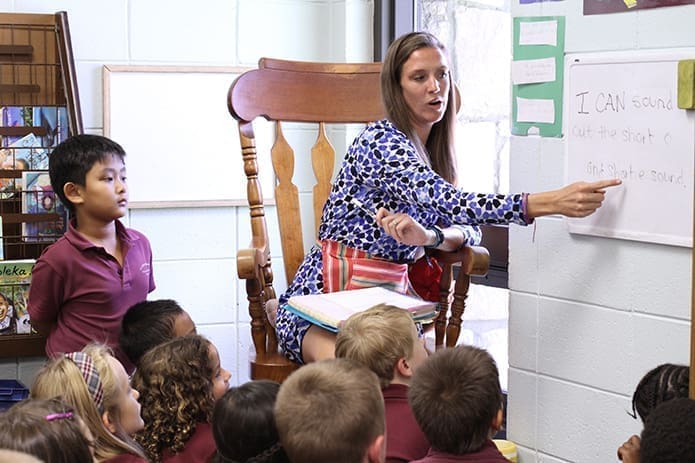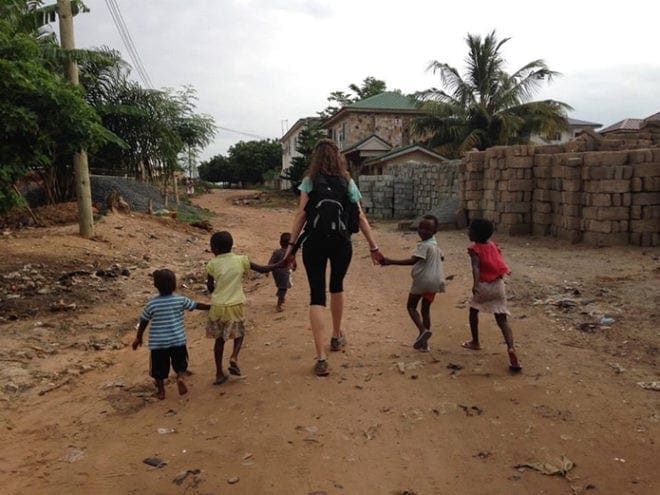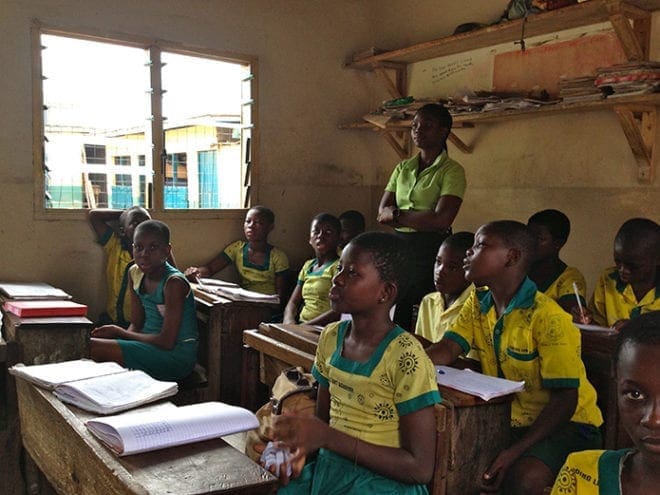 Photo By Michael Alexander
Photo By Michael AlexanderLilburn
St. John Neumann teacher spends summer consulting in Ghana
By NICHOLE GOLDEN, Staff Writer | Published August 22, 2014
LILBURN—Emily Ice, beginning her third year of teaching at St. John Neumann Regional School in Lilburn, has always drawn upon the wisdom of more experienced teachers. In turn, Ice spent the summer in West Africa sharing what she has learned with others.
A second-grade teacher, Ice was in Ghana from May 31 to July 20 as a consultant for the University of Notre Dame and Edify, helping teachers and students to incorporate computer technology into the classroom. Edify is a nonprofit organization that provides private schools in poor countries funds needed for improvements and teacher training.
“Some of those students had never clicked a mouse before,” said Ice. “You always have to start with the basics.”
Ice first came to St. John Neumann as a teacher with Notre Dame’s Alliance for Catholic Education or ACE.
The ACE program accepts 90 applicants annually who teach in selected Catholic schools nationwide for two years as a service. The ACE scholars complete curriculum on the campus of Notre Dame in South Bend, Indiana, and online, and earn a cost-free master’s degree in education.

Emily Ice, a second-grade teacher at St. John Neumann Regional School in Lilburn, spent the summer in Ghana, West Africa, working for the University of Notre Dame and Edify to help students use computer labs. Above, she takes a stroll with children who live near one of the schools.
Ice, and another American experienced in blended technology, spent time helping teachers in Ghana to use their computer labs to full potential.
“They don’t really have the capacity to use the technology,” said Ice. “It’s all in theory.”
The pair visited four schools and first observed students at work and then narrowed their focus area to middle school math.
With classrooms of 40 to 50 students, there is limited time as students are copying problems by hand from the board.
“They can only get through three or four math problems in a given time,” said Ice.
The computers, however, offer great potential, and Ice helped launch the Kahn Academy Lite computer software program. Children received user names and log-ins, and teachers established accounts. Color-coding allowed children to work at their own paces and enabled instructors to better gauge a student’s progress.
KA Lite also has software for instruction in social studies and science.

Celestine, a 20-year-old teacher in Ghana, uses a small-group rotation method of instruction in the classroom. The concept was introduced by St. John Neumann teacher Emily Ice, who was there to assist teachers and launch software programs.
Ice was also able to share the concept of small-group rotating as an instruction method. If a school has 11 computers available and 25 students, then the remaining students can work on another activity until computers are free. This concept was novel to teachers there.
“Teachers in Ghana are very, very young,” explained Ice. The average age of an instructor is 19 or 20.
“Their end goal is not to be a teacher. One of my goals all summer was to show how much I love teaching,” said Ice.
The use of technology in the classroom can help these youthful instructors view education as a more exciting, appealing career.
While in Ghana, Ice spent time in the capital city of Accra, and the communities of Asienya and Ashaiman, one of the poorer areas.
The schools assisted by Edify are private, Christian schools started by businessmen.
“They are really taking ownership of it,” Ice said of the computers and software.
The Christians in Ghana are devout, and there is much religious fervor, said Ice. Not all are Catholics. “It’s a mix,” said Ice, who was able to attend Mass while there.
For Ice, who had worked with the Peace Corps in the West African nation of Benin for 10 months, Ghana was an easy experience.
“Ghana is an English-speaking country,” she said.
In French-speaking Benin, Ice’s work included teaching about alternatives to corporal punishment and holding English spelling bees. Education is “really the ticket for getting out,” she said.
Transportation was the biggest issue the Americans had while in Ghana.
“The traffic was horrendous. The infrastructure isn’t in place,” added Ice.
Part of her daily commute included riding on a “tro-tro,” a bus that seats 12 to 16 people, as well as a taxi trip.
A native of Rye, New York, Ice said one of the lessons she brings back to her own classroom is “celebrating the little things in life.”
The world traveler has already shared pictures of her African safari field trip with her colleagues at St. John Neumann.
Principal Alex Porto said Ice is a great asset to the school.
“We are a service-oriented school, and Emily’s international service experiences serve as a valuable example to the students in her class as well as to the entire school community,” said Porto. “Emily is always willing to share her personal experiences with her students, which brings to life everything that we try to instill in our students about the importance of showing our faith through our service to others.”
Ice completed her undergraduate work at Duke University, in Durham, North Carolina, majoring in psychology with a minor in education. “I knew in the long run I wanted to be a teacher,” she said.
A friend of a friend told Ice about Notre Dame’s ACE program while she was in Haiti working.
“I really latched onto the idea,” said Ice. “I wanted a program that had support built into it.”
ACE teachers live in community together during service years, receive intense summer instruction, and attend spiritual retreats throughout the year.
Porto called the ACE program a “blessing” for the school.
“The ACE teachers are not only well prepared as educators, but they possess a strong sense of faith and spirituality, which aligns perfectly with our school’s philosophy and mission,” said Porto.
Because of her love of travel, Ice enjoys that St. John Neumann is such an “incredibly diverse school.” The school is a National Blue Ribbon School of Excellence serving students in kindergarten through eighth grade.
The second-grade students will be assigned a cultural research project, and Ice will join in by dressing in her West African attire.
Although the children and teachers in Africa wanted her to stay, she plans on making Atlanta her home.
“I have 25 students waiting for me,” she told them at summer’s end. “That keeps pulling me back.”